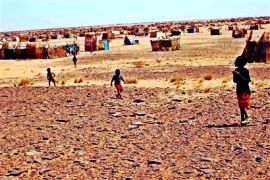IDPs in Khartoum seem indecisive about return to South Sudan
Nov 28, 2006 (KHARTOUM) — Displaced people from the south of Sudan, and Nuba Mountains who now live in the capital, Khartoum, face voluntary repatriations to homes they have not seen for decades. But they seem reluctant to return.
 Now there are attempts by the government and UN agencies to facilitate the return of these internally displaced people (IDPs). But this is not a straightforward process. Many consider Khartoum as ‘home’, Christian Aid reported.
Now there are attempts by the government and UN agencies to facilitate the return of these internally displaced people (IDPs). But this is not a straightforward process. Many consider Khartoum as ‘home’, Christian Aid reported.
The younger generations have only ever known city life and after more than 20 years of war the south has little in the way of schools, health facilities or jobs.
Many of the southerners who had made a life for themselves in Khartoum found themselves brutally moved on after the death of the charismatic southerner leader, Dr John Garang, in July 2005.
Following riots on the news of his death, the government moved quickly to forcibly evict them from their homes and remove them from the city. Many were trucked out to Al Fatah, a bleak, unforgiving moonscape 55 kilometres north of Khartoum.
There are no services there. Water has to be purchased from vendors and the only school is an hour’s walk away.
Christian Aid partner the Sudan Social Development Organisation (SUDO) negotiated hard with the government to gain permission to work in Al Fatah. It is building latrines and holding hygiene-awareness workshops.
Farida Usman, 23, is a perfect example of the limbo in which many of these people find themselves. She arrived in Khartoum as a baby with her mother, fleeing the war in the Nuba Mountains. She has never been to Nuba Mountains and is married to a man from Darfur.
‘Nuba means nothing to me, I have lived here all my life,’ says Farida. ‘Khartoum is my home. I met my husband here, and I would never have met him in Nuba.’
Jebel Aulia, another sprawling camp of more than 50,000 people, is 50 kilometres south of the capital. Most have lived here for decades, although recently there has been an influx of families from Darfur.
Recent attempts to register the IDPs for voluntary repatriation to the south have failed due to political tensions in the camp.
The older residents who remember their homes in the south would like to return, but are reluctant to go unless they receive guarantees of help.
Mary Eliodora Wadi, 40, has eight children and would like to return to Juba after ten years in Jebel Aulia. But her children are at school in Khartoum and she does not want to disrupt their education.
Mary’s sister returned to her native home with her two teenage children. She has decided to stay there, but the two teenagers are on their way back to live with an uncle in Khartoum. They could not adjust to life in the south.
Residents of the ‘black belt’ around the sprawling Khartoum city are camps where displaced people have been living for decades; most were forced to flee by the civil war in the south and the severe drought of 1984.
(Christian Aid/ST)
